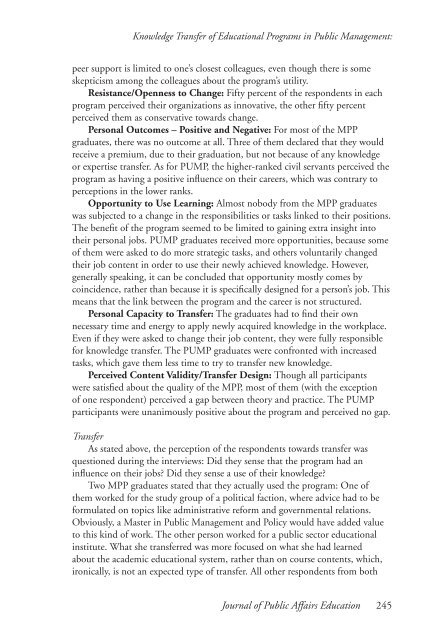JOURNAL OF PUBLIC AFFAIRS EDUCATION - Naspaa
JOURNAL OF PUBLIC AFFAIRS EDUCATION - Naspaa
JOURNAL OF PUBLIC AFFAIRS EDUCATION - Naspaa
Create successful ePaper yourself
Turn your PDF publications into a flip-book with our unique Google optimized e-Paper software.
Knowledge Transfer of Educational Programs in Public Management:peer support is limited to one’s closest colleagues, even though there is someskepticism among the colleagues about the program’s utility.Resistance/Openness to Change: Fifty percent of the respondents in eachprogram perceived their organizations as innovative, the other fifty percentperceived them as conservative towards change.Personal Outcomes – Positive and Negative: For most of the MPPgraduates, there was no outcome at all. Three of them declared that they wouldreceive a premium, due to their graduation, but not because of any knowledgeor expertise transfer. As for PUMP, the higher-ranked civil servants perceived theprogram as having a positive influence on their careers, which was contrary toperceptions in the lower ranks.Opportunity to Use Learning: Almost nobody from the MPP graduateswas subjected to a change in the responsibilities or tasks linked to their positions.The benefit of the program seemed to be limited to gaining extra insight intotheir personal jobs. PUMP graduates received more opportunities, because someof them were asked to do more strategic tasks, and others voluntarily changedtheir job content in order to use their newly achieved knowledge. However,generally speaking, it can be concluded that opportunity mostly comes bycoincidence, rather than because it is specifically designed for a person’s job. Thismeans that the link between the program and the career is not structured.Personal Capacity to Transfer: The graduates had to find their ownnecessary time and energy to apply newly acquired knowledge in the workplace.Even if they were asked to change their job content, they were fully responsiblefor knowledge transfer. The PUMP graduates were confronted with increasedtasks, which gave them less time to try to transfer new knowledge.Perceived Content Validity/Transfer Design: Though all participantswere satisfied about the quality of the MPP, most of them (with the exceptionof one respondent) perceived a gap between theory and practice. The PUMPparticipants were unanimously positive about the program and perceived no gap.TransferAs stated above, the perception of the respondents towards transfer wasquestioned during the interviews: Did they sense that the program had aninfluence on their jobs? Did they sense a use of their knowledge?Two MPP graduates stated that they actually used the program: One ofthem worked for the study group of a political faction, where advice had to beformulated on topics like administrative reform and governmental relations.Obviously, a Master in Public Management and Policy would have added valueto this kind of work. The other person worked for a public sector educationalinstitute. What she transferred was more focused on what she had learnedabout the academic educational system, rather than on course contents, which,ironically, is not an expected type of transfer. All other respondents from bothJournal of Public Affairs Education 245
















